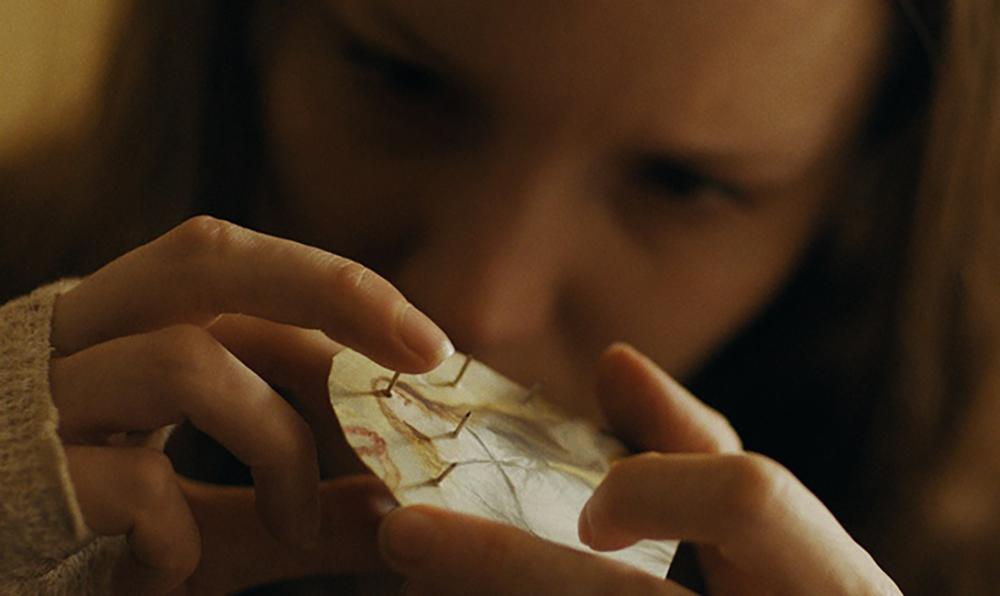Cinema often uses God, religion, evil, and redemption as its center subject. Simultaneously, cinema has tried to use it in the most inspiring and painful way to showcase these stories and messages. When it comes to the horror genre, it is a sacred light that saves the world or the elements that will destroy the world. We have often seen horror plots that revolve around such subplots; today came “Saint Maud,” a film that falls under this subplot yet is unique and fresh in its own way.
Maud (Morfydd Clark) is a young girl living town of Scarborough. She is a nurse by profession and has lost her job at the hospital. After a tragic event, she has found her way to religion and becomes progressively spiritual in her views. She persistently trusts in Catholic ideology and speaks to God and asks him what future He has set for her. She gets hired to care for a former dancer with terminal cancer named Amanda (Jennifer Ehle). Her days are procedure mostly with cleaning, cooking, and recurrent adjust of distress from her ward.
Maud has some strange things within her; she uses different kind of tortures on herself. She also undergoes some unusual kind of exaltation that makes her bones tremble, which changes her breath raspy and heavy. She begins to quirk in a physically impossible way. In her eyes, her connection with God is intimate and inmost.
Maud soon forms a close connection with her client Amanda who is intrigued by her faith, calling her the ‘little savior.’ Maud takes it as an indication, and believes her mission is to deliver Amanda from the unholy.
Soon Maud starts to consider Amanda as a big sinner for her fun parties. Their relation gets shaky when Maud gets fired for her action, which puts Amanda and her friend Carol (Lily Frazer) on rocky ground. Towards the end of the story, we get more and more dark twists.

“Saint Maud” is the feature film writing and directorial debut of Rose Glass; her writing approach is fresh and unique and reflected in the story she has created. The film’s story is utterly original, that provides an alluring transformation to the ostensible: a torn and faulty soul doing her foremost to achieve a redemptive track after dark bygone circumstance, while grappling with subtle behavioral muddles. The writer does incredible work, creating protagonists that viewers can connect to with their emotions, like self-consciousness. In contrast, audiences can commiserate with her seclusion and strive to connect with others by keeping away the horrendous deeds ahead for her and her surroundings.
The horror elements in the film connect directly to viewers’ minds. The only thing that the film falls short with is there is no clarity for Maud’s past life, which might help viewers gain better understanding. The movie delivers a fresh new take on the subtype in roaring and truly chilling fashion: concurrently euphoric and horrific.
Alongside the smartly clever writing, in the director’s role, Glass exhibits astonishingly devious themes, which helps the film become deeper and gives it a chillingly dreamlike tone. With such a small budget, she manages to utilize aquatic and fiery imagery throughout.
One of the film’s key elements is the top-notch acting of the cast; Morfydd Clark as Maud is outstanding. She seems to get into the skin of the difficult and disturbing role. Jennifer Ehle, as the ill dancer, Amanda, is equally good along with the supporting cast. Cinematographer Ben Fordesman’s camera moves perfectly to capture the emotions and outer world of characters. He adeptly encapsulates muddling visual repercussions, the soul-stirring and heinous moments unique for both the devout and body horror class.
“Saint Maud” is a smartly crafted film—a unique and magnificent slow-burner. Overall, the film is a curious, gorgeous, and deeply thrilling piece that mixes psychological, religious, and body horror perfectly. The film is a must-watch for those who enjoy the intense psychological horror. Even if one doesn’t enjoy it, it definitely deserves your attention for its story, direction, and amazing acting. The film won the ‘Best Film-Honorable Mention, Rose Glass’ award at the London Film Festival and premiered at the Toronto International Film Festival (TIFF).
1 Comment
The Reviewer got a good test in films . Good work The movie Buff .